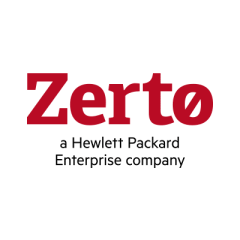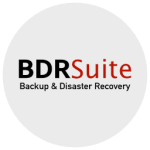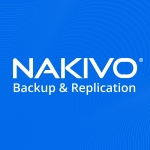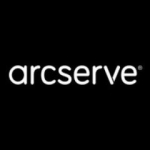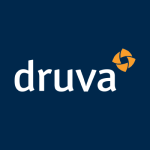What is our primary use case?
We use this solution for disaster recovery and business continuance.
We are protecting: SQL, our file servers, and some other applications that are specific to the healthcare domain.
How has it helped my organization?
In terms of providing continuous data protection, Zerto has been great. We've had no real issues and it's pretty easy to work with.
At this time, we do not use Zerto for long-term retention. It's something that we may look into, although we don't protect all of our VMs. We only have 60 licenses, but we have more than 300 VMs. We use Veeam for the actual backups at the moment, and it didn't seem practical to have two separate solutions, where we use Zerto for a few and Veeam for the rest. Licensing-wise, it was too expensive to put replication functionality on every VM, just to get a backup of it. I know that Zerto is changing its licensing so that you can get a backup only. However, when we purchased Veeam, it was for three years and we still have part of a year left. After that expires, we will revisit it.
Prior to implementing Zerto, we didn't really have any way at all if there was a disaster at one site to be able to spin things up at the other site. It would have been restored from backups, but we didn't have a backup environment at the other site that they would restore there. This meant that depending on how bad the outage was, it was going to be weeks or months to be able to get back up and running. Now we're in a situation, at least with our key applications, that we could get those back up in a matter of minutes versus weeks. There is now a much better comfort level there.
If we had to failback or move workloads, Zerto would decrease the time it takes to do so. Fortunately, we've never had an event where we've actually had to use Zerto for a live failover. We test the VPGs and get the actual individual teams that run the software involved to test everything out, to make sure it's good. Other than that, fortunately, we haven't really had a need to actually fail anything over at this point.
We have leveraged it at times to move a workload. An example of this is that we've had servers that we were initially told were going to be built at one site, but then a couple of weeks later, it's "Well, no, we want this at the other site." So, instead of having to create a new VM at the other site, decommission the old one, and all that work that's involved with that, we just used Zerto to move it. This is something that saved us a lot of time and it worked perfectly. Between building another one and decommissioning, it is probably a savings of three days' work between all of the people involved.
Fortunately, we haven't had to use Zerto to recover due to a ransomware attack. We haven't been hit with anything like that yet. That's one of the things that also made it attractive for us, was that we're able to potentially get to a point in time just before that happened.
We have also used it in a scenario where we've had a vendor doing an upgrade. We replicated it to the same site instead of the alternate site, just so that if something went wrong we'd have a more instant restore point that we could pick from versus our backups. Since our backups only run once a night, we could have potentially lost a decent amount of data. Again, the upgrade went smoothly, so we didn't have to leverage it, but if there was going to be a problem with that then it would have saved us time and potentially data.
What is most valuable?
The most valuable feature is the ease of upgrades. We've updated it numerous times since we started, and we can perform upgrades, including with VMware, without impacting anything in conjunction with it.
The reporting on failovers, including the step-by-step and the times, is useful because we can run through a failover and provide reports on it.
I find Zerto extremely easy to use. Setting up VPGs, the upgrade process, failover, and testing are all super easy to do. It is all very straightforward, including the initial setup.
What needs improvement?
I would like to have an overall orchestration capability that would enable you to do multiple VPGs in some sort of order, with delays in between. For example, at least in our testing scenario, we have our domain controllers. We have to fail that over first, get those up and running before we bring up the application side so that people can log in. If there was an actual failover, there would be certain things that would have to failover first, and get them running. Then, the application would be second, like SQL for example. For our dialysis application, one would have to have SQL up and running first before that. It would be nice to be able to select both and then say, start up this VPG and then wait 10 minutes and then fire up this one.
For how long have I used the solution?
I have been using Zerto for between three and four years, since 2018
What do I think about the stability of the solution?
I find this product super stable and I've had basically zero problems with it. A couple of minor things came up, and support resolved them pretty much instantly. We've never actually been down with it, but one problem was where it didn't recognize our version of the VMware. It was an entry in some INI file but that was quickly resolved.
What do I think about the scalability of the solution?
I would think it scales great and it's just a matter of licensing. Right now, we have just the basic license that enables us to go one-to-one. We do want to go to the one-to-many and then out to the cloud, which is an option that would be better for us. We're just waiting to get the cloud connectivity before we upgrade the license. In this aspect, it should scale well.
At this point, myself and perhaps one other person use the product. We're licensed for 60 VMs and we have just slightly less than that, in the upper 50s. I would think that our usage in the future will increase.
Every time that we have a project come along, as part of that, they're supposed to verify what the DR business continuity needs are in terms of RTO and RPO. The only option for us other than this is backups, which are up to 24 hours. If that doesn't meet the needs of a new project, we are supposed to get a Zerto license for it. It's something that should be increasing over time.
How are customer service and technical support?
The technical support from Zerto has been great. Anytime that we put a ticket in, they've called back very quickly, and the issues have always been resolved in less than a day. Really, it happens within hours.
It is also nice that you can open a case directly from the management console, instead of having to place a call and wait in a queue. When you open a ticket, it's created, and then they call you back. It seems to be a great process.
Which solution did I use previously and why did I switch?
We are currently using Veeam for backups only, whereas Zerto is used for our business continuity disaster recovery. We have never used Veeam in terms of DR. When we purchased Zerto, you had to buy a license for replication. You could also leverage it for backup, but it didn't make sense because it was more pricey than using Veeam for that.
For backups, Veeam is pretty easy to use. Backups seem slightly more complex than the DR part, at least in terms of the way Zerto is doing them. Ultimately, it's easier for me to work with than Veeam's backup, per se. But backups historically have always been a little bit more tricky.
We used to have IBM Spectrum Protect, which was a total beast. So, Veeam is much easier to use than our previous backup solution. I know Veeam does have a DR product and we've never really looked at it. So, I can't really compare Zerto to that. I know Zerto does seem to be a better solution.
Prior to working with Zerto, we didn't have a DR business continuity plan. Essentially, we had no staff working on it.
How was the initial setup?
The initial setup is straightforward. We had it up and running in no time at all, and it wasn't something that took us weeks or months to implement. The install was done in less than a day and we were already starting to create VPGs immediately.
We started off as a trial running a PoC. We had a trial license mainly because, being in the healthcare industry, we have some unique applications. The other options for disaster recovery on those were going to be pretty pricey, and then, that would be a solution just for that one particular application. At that point, we were more interested in having the backups.
We don't like having five different backup utilities and we were hoping to have just one product that would handle all of our DR business continuance needs. That seemed to be Zerto when we looked at it, so we wanted to do a proof of concept on one main application, Meditech. It is our primary healthcare information system that everybody uses. It wasn't officially a supported DR business continuity methodology for it, but we did put it through the wringer a bit during the PoC phase to make sure it worked before we were really committed.
A lot of the other applications are straightforward, so we weren't as concerned with what we were going to do after the fact. But Medtech was one of the big driving ones that needed to be tested out before we committed to purchasing it. We did make calls to other hospitals who were Meditech customers as well, that were also using Zerto, to get a better comfort level based on their experiences.
What about the implementation team?
Two of us from the company, including a technical analyst and an enterprise architect, were involved in the initial setup. One of the vendor's reps came down to assist us with the first one, and he was great to deal with. Any questions that we had, he was able to answer them right away. He didn't say things like "I'll get back to you on that". He definitely knew what he was doing.
The install was pretty basic and we probably could have done it ourselves regardless, but just to fill in some of the knowledge gaps of how it actually works under the covers, he was able to provide that and some other pointers on things.
What was our ROI?
In terms of ROI, it is hard to say. Fortunately, we haven't had any issues. Obviously, if we had an issue we would have seen ROI, but it's kind of like insurance. You pay for it and then if nothing ever happens, that's it. But, if something were to happen, then you're pretty glad that you had it in place.
Similarly, if you have an accident with your car, it's good that you had insurance because it's saving you money. But if you never have an accident, then you're spending money. In that way, I look at any disaster recovery business continuity as insurance.
Although we've never had to use it, if we do then we will see ROI the first time.
What's my experience with pricing, setup cost, and licensing?
The pricing doesn't seem too bad for what it does. I know that the license that we have is being deprecated and I think you can only get their enterprise one moving forward. I know that we're supposed to change to that regardless, which is the one that gives us the ability to move out to the cloud and do multiple hypervisors, et cetera.
Overall, it seems fair to me. Plus, that you can do backups and everything with it means that it is even of greater value if you're doing your entire environment. It could cover everything you need to cover, plus the backups, all for one price.
Which other solutions did I evaluate?
We were looking at VMware Site Recovery Manager at that time as the other option, and Zerto seemed a lot easier to use and easier upgrade paths. Even within the path to update your VMware environment with two products, it seems like the easier of the two products.
What other advice do I have?
Now that a backup-only license will be available for Zero, switching away from Veeam is something that we'll look at when the time comes for Veeam renewals. One of the things that we'll do is a cost analysis, to see what it costs comparatively.
We are not using DR in the cloud, although we are looking at using it in the future.
My advice for anybody who is looking into implementing Zerto is to do like we did, which was to implement a proof of concept, just to feel good about the solution, that it's going to meet your needs. Feel free to reach out to other people that are in your industry, as we did with other healthcare people. There should be a decent number of people out there that are doing what you're trying to do.
Zerto seems pretty good at hooking people up with other customers that are doing the same thing they're doing, so you have a chance to talk to them directly. I've been on those calls and Zerto basically just hooks you up with that person and they don't stay on the call themselves. It's just you and them talking, so they're pretty unbiased answers from most people. I definitely suggest reaching out to Zerto to get feedback from customers. Basically, just do your due diligence and research.
I would rate this solution a ten out of ten.
Which deployment model are you using for this solution?
On-premises
Disclosure: PeerSpot contacted the reviewer to collect the review and to validate authenticity. The reviewer was referred by the vendor, but the review is not subject to editing or approval by the vendor.

